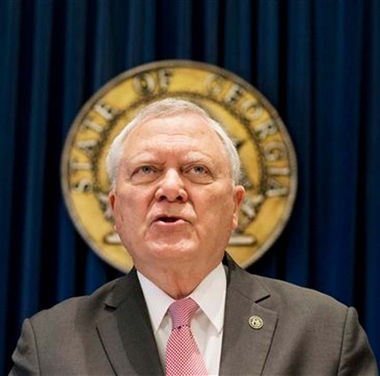Two GOP governors, two different calculations on LGBT rights

Atlanta (AP) — Two Republican governors. Two proposals at the heart of LGBT rights. One rejection. One new law.
Georgia Gov. Nathan Deal said he was preventing discrimination and protecting commerce when he announced his veto of a measure that would have allowed certain individuals, businesses and faith organizations to deny services based on "sincerely held religious beliefs."
In North Carolina, Gov. Pat McCrory said he was protecting his citizens' privacy and using "common sense" when he signed into law a bill that, among other things, prohibits local anti-discrimination ordinances and obligates transgender people to use restrooms matching the gender on their birth certificates.
Their moves highlight a familiar GOP fault line between business conservatives, led by large corporations that have embraced LGBT rights, and social conservatives, who have ramped up their calls for their own legal protections since the U.S. Supreme Court legalized same-sex marriage last year.
The tussle is particularly fierce in statehouses like those in Atlanta and Raleigh, where the GOP holds overwhelmingly majorities.
"There was no escape hatch," former Deal aide Brian Robinson said. "He was getting torn between two factions ... both of which have supported him strongly for years."
Yet there's a stark political reality in the governors' different conclusions: Deal is a 74-year-old in his second term, unable to a seek a third consecutive term and almost certain never to face Georgia voters again; McCrory is a 59-year-old running for re-election, with a newfound general election issue smoldering in his lap.
So Deal was free to wax eloquent Monday about constitutional freedoms, largely avoiding explicit commentary on same-sex marriage and LGBT rights as he explained his decision.
"If indeed our religious liberty is conferred by God and not by man-made government, we should heed the 'hands-off' admonition of the First Amendment to our Constitution," he said.
The veto disappointed some religious conservatives and enraged others, all of them promising to press the matter again. But Deal stood his ground, alluding to his own lifelong Southern Baptist affiliation. "I do not think we have to discriminate against anyone," he said, "to protect the faith-based community."
Conversely, McCrory now must try to frame the new North Carolina law in his favor, while his Democratic general election opponent, state Attorney General Roy Cooper, does the same. The challenge for both men is to placate their respective party bases — gay-rights supporting liberals for Cooper, social conservatives for McCrory — while appealing to independents who hold sway in the closely divided state.
McCrory and his aides focus on provisions that require people to use multistall bathrooms of the sex matching their birth certificates at state agencies, schools and universities. The law was the product of a special session Republicans called essentially to override a city of Charlotte ordinance allowing transgender individuals to use the bathroom assigned to their gender identity.
Chris LaCivita, McCrory's chief campaign strategist, said it's a simple question: "Can a male use a female bathroom and a female locker room?" LaCivita said McCrory "has always maintained that this is a case about reasonable expectations of privacy."
Opponents of an anti-discrimination ordinance in Houston successfully used the same arguments in a 2015 referendum.
Cooper answered Tuesday that the North Carolina law is a "national embarrassment," and said he would not defend it as attorney general against a pending federal lawsuit.
He and other Democrats also tried to define the bill by more than transgender bathroom access. The law blocks workers from suing in state courts over workplace discrimination based on race, religion, color, national origin, age, sex or handicap. Further, it also bars local anti-discrimination measures to protect people on the basis of sexual orientation or gender identity, while separately preventing local governments from setting their own minimum wage or requiring businesses to provide paid sick leave.
All that "will set North Carolina's economy back if we don't repeal it," Cooper said, echoing the argument business leaders made in pressuring Deal for a veto in Georgia.
More than 500 companies joined a coalition led by Coca-Cola and other big-name Georgia firms. The Walt Disney Co., Marvel Studios and Salesforce.com threatened to take business elsewhere. The NFL suggested Atlanta could lose its bids for the 2019 or 2020 Super Bowl.
McCrory heeded such arguments last year when he vetoed a "religious freedom" bill that was more limited than what Deal nixed. (The Legislature overrode McCrory's veto.) On Monday, McCrory doubled down, saying he'd "not had one corporation tell me that they're threatening to leave," though the NBA has now suggested it could move professional basketball's 2017 All-Star game from Charlotte.
Georgia Republican consultant Chip Lake said those arguments are what ultimately drive the issue, regardless of specific and often complicated provisions that McCrory, Cooper, Deal and others try to parse.
"We get caught up in arguments of what's right and what's wrong, but this becomes an issue where we just have to ask, 'Are the economic consequences real or perceived?'" Lake said. "You can call it economic extortion. We can talk about 'that's unfair,' but that's the reality."
By Bill Barrow, Associated Press. Copyright 2016 The Associated Press. All rights reserved. This material may not be published, broadcast, rewritten or redistributed.
The Gayly – March 30, 2016 @ 7:45 a.m.





